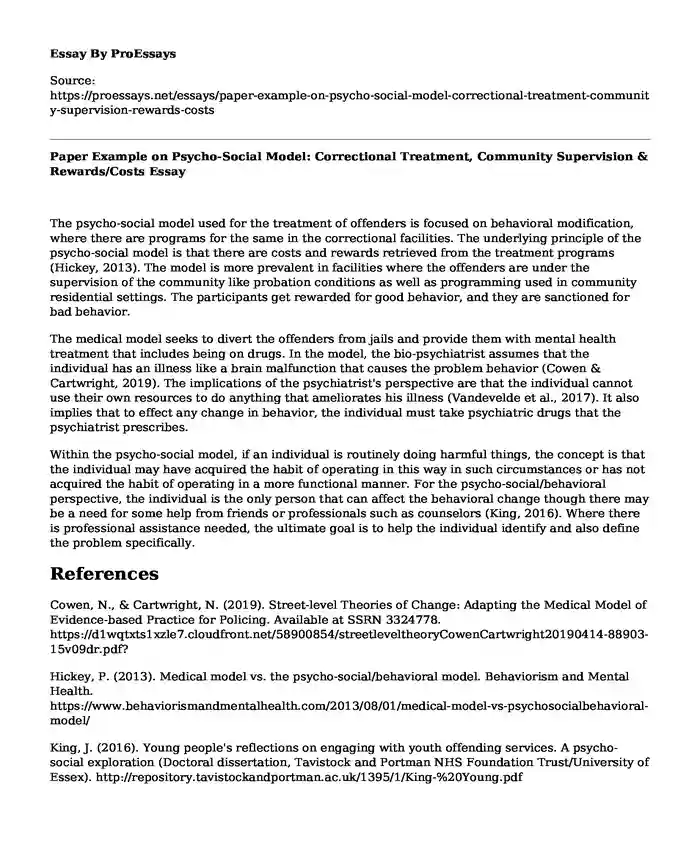The psycho-social model used for the treatment of offenders is focused on behavioral modification, where there are programs for the same in the correctional facilities. The underlying principle of the psycho-social model is that there are costs and rewards retrieved from the treatment programs (Hickey, 2013). The model is more prevalent in facilities where the offenders are under the supervision of the community like probation conditions as well as programming used in community residential settings. The participants get rewarded for good behavior, and they are sanctioned for bad behavior.
The medical model seeks to divert the offenders from jails and provide them with mental health treatment that includes being on drugs. In the model, the bio-psychiatrist assumes that the individual has an illness like a brain malfunction that causes the problem behavior (Cowen & Cartwright, 2019). The implications of the psychiatrist's perspective are that the individual cannot use their own resources to do anything that ameliorates his illness (Vandevelde et al., 2017). It also implies that to effect any change in behavior, the individual must take psychiatric drugs that the psychiatrist prescribes.
Within the psycho-social model, if an individual is routinely doing harmful things, the concept is that the individual may have acquired the habit of operating in this way in such circumstances or has not acquired the habit of operating in a more functional manner. For the psycho-social/behavioral perspective, the individual is the only person that can affect the behavioral change though there may be a need for some help from friends or professionals such as counselors (King, 2016). Where there is professional assistance needed, the ultimate goal is to help the individual identify and also define the problem specifically.
References
Cowen, N., & Cartwright, N. (2019). Street-level Theories of Change: Adapting the Medical Model of Evidence-based Practice for Policing. Available at SSRN 3324778. https://d1wqtxts1xzle7.cloudfront.net/58900854/streetleveltheoryCowenCartwright20190414-88903-15v09dr.pdf?
Hickey, P. (2013). Medical model vs. the psycho-social/behavioral model. Behaviorism and Mental Health. https://www.behaviorismandmentalhealth.com/2013/08/01/medical-model-vs-psychosocialbehavioral-model/
King, J. (2016). Young people's reflections on engaging with youth offending services. A psycho-social exploration (Doctoral dissertation, Tavistock and Portman NHS Foundation Trust/University of Essex). http://repository.tavistockandportman.ac.uk/1395/1/King-%20Young.pdf
Vandevelde, S., Vander Laenen, F., Van Damme, L., Vanderplasschen, W., Audenaert, K., Broekaert, E., & Vander Beken, T. (2017). Dilemmas in applying strengths-based approaches in working with offenders with mental illness: A critical multidisciplinary review. Aggression and violent behavior, 32, 71-79. https://biblio.ugent.be/publication/8160055/file/8160343.pdf
Cite this page
Paper Example on Psycho-Social Model: Correctional Treatment, Community Supervision & Rewards/Costs. (2023, Sep 20). Retrieved from https://proessays.net/essays/paper-example-on-psycho-social-model-correctional-treatment-community-supervision-rewards-costs
If you are the original author of this essay and no longer wish to have it published on the ProEssays website, please click below to request its removal:
- Nursing Informatics Administrative Applications
- Managing Specific Medical Emergencies in Primary Care
- Course Work on Self-efficacy and Self-control
- Hand Hygiene in Nursing - Research Paper
- Creating a Culture That Supports Data, Technology, and Innovation
- Article Analysis Essay on How Coronavirus Impacts the Global Supply Chain
- Movie Analysis Essay on Stress, A portrait of a killer







